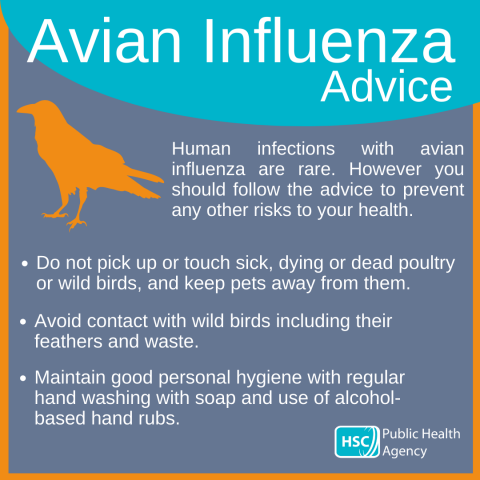PHA advice after avian flu detected in wild birds

The Public Health Agency is reminding the public not to touch dead birds. The reminder comes following a Department of Agriculture Environment and Rural Affairs (DAERA) announcement about the presence of avian influenza in two wild birds retrieved from the Belfast Waterworks site last week.
Dr Philip Veal, Consultant in Health Protection at the PHA, said:“Human infections with avian influenza are rare. However you should observe the following advice to prevent any other risks to your health:
- do not pick up or touch sick, dying or dead poultry or wild birds, and keep pets away from them;
- avoid contact with surfaces contaminated with bird faeces;
- avoid untreated bird feathers (such as those found in the environment) and other bird waste;
- maintain good personal hygiene with regular hand washing with soap and use of alcohol-based hand rubs.
“Although human infections with avian influenza are rare, some viruses, such as H5N1 or H7N9, have been associated with human disease. The symptoms of avian influenza in humans vary considerably depending on the strain or subtype of the virus involved. Most infections take the form of a flu-like illness, such as fever, cough, body or muscle pain, sore throat, runny nose. Other symptoms can include conjunctivitis – red, sore and discharging eyes.”
It is important to remember that the vast majority of bird deaths in the UK will not be related to avian influenza, based on information from surveillance activities. However if you find dead waterfowl (ducks, geese or swans) or other dead wild birds, such as gulls or birds of prey, you should report them to DAERA Helpline 0300 200 7840 in Northern Ireland.
DAERA will make arrangements to collect and test the bird for avian influenza to help understand how any avian influenza disease is distributed both geographically and among different bird species. They will also take your details so that you can be contacted later if required.
Further information on avian influenza (bird flu) including symptoms, diagnosis, management and epidemiology is available at www.gov.uk/government/collections/avian-influenza-guidance-data-and-analysis
See the DAERA website www.daera-ni.gov.uk/articles/avian-influenza-ai for more information or to read DAREA statement in full visit www.daera-ni.gov.uk/news/avian-influenza-housing-order-come-force-0
ENDS
